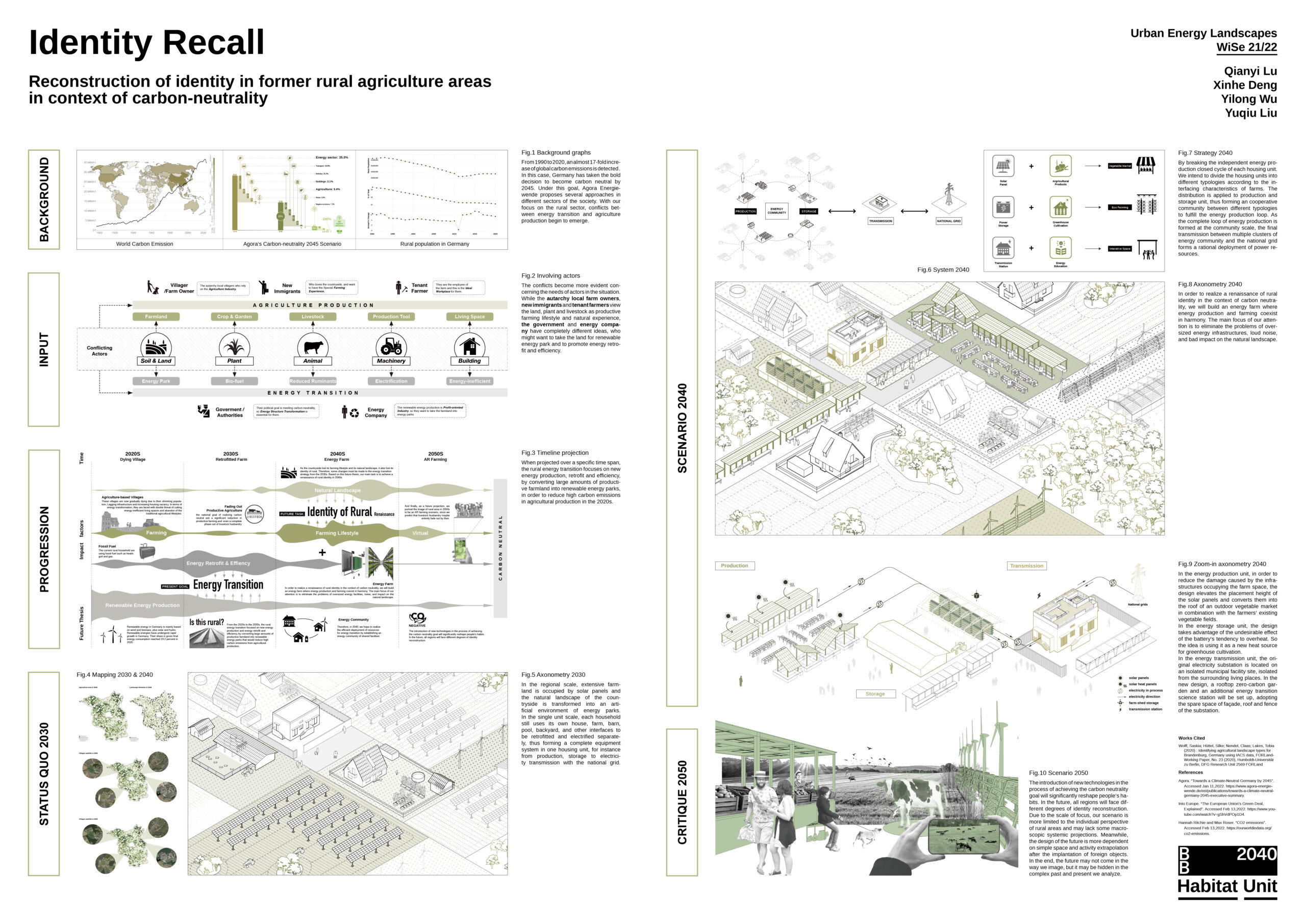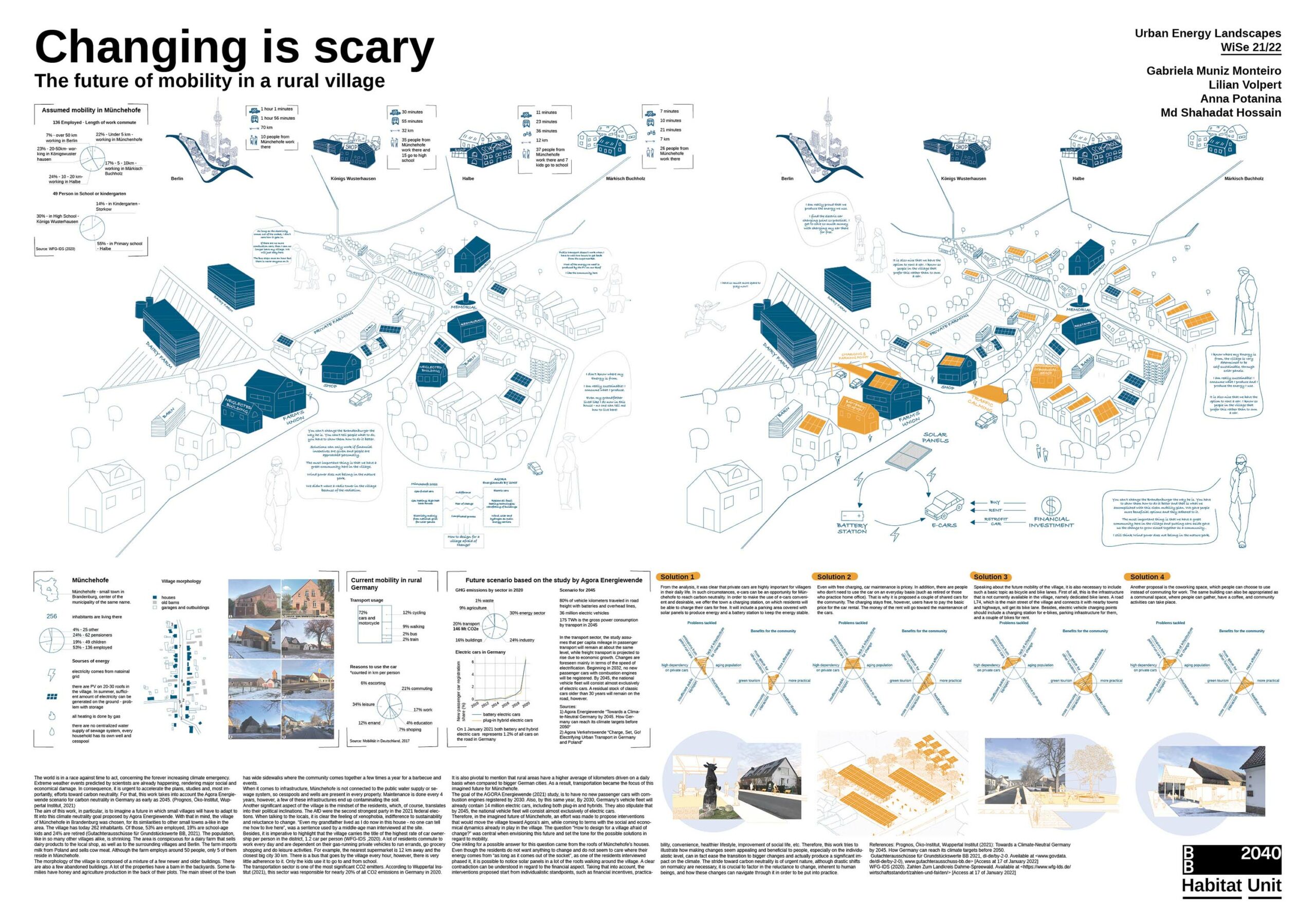Urban Energy Landscapes I Rural Scapes
Group 1
Group 2
By: Qianyi Lu, Xinhe Deng, Yilong Wu, Yuqiu Liu (Group 1)
Anna Potanina, Gabriela Muniz Monteiro, Lilian Volpert, Md Shahadat Hossain (Group B)
Studio:
“Urban Energy Landscapes”
Prof. Dr. Elke Beyer
Rosa Pintos Hanhausen
David Bauer
Veit Vogel
Habitat Unit WS 2021/22
Identity Recall
Reconstruction of identity in former rural agriculture areas in context of carbon-neutrality
Due to climate change, loss of biodiversity and environmental pollution caused by greenhouse gas emissions, humans are making the Earth a fragmented and increasingly uninhabitable planet. Under such circumstances, Germany has taken the bold decision to become carbon-neutral by 2045. To achieve this goal, Agora Energiewende proposes several approaches in their executive summary.
When we put our attention on the rural sector, contradictions between Energy transition and Agriculture Production begin to emerge, as the national goal of realizing carbon neutral ask a significant reduction in productive farming and even a gradual phase out of livestock husbandry. This causes severe damage to the agriculture-based villages in the rural area of Brandenburg. These villages are now rapidly dying due to their shrinking population, lagging infrastructure and increasing housing vacancy.
Projected over a specific time span, these conflicting needs act as the main impact factors influencing the forms of rural areas under different strategies towards the goal of carbon neutrality. From the 2020s, the rural energy transition focused on new energy production, retrofit and efficiency, by converting large amounts of productive farmland into renewable energy parks, in order to reduce high carbon emissions in agricultural production. However, when the retrofitted farmland is filled with solar panels and wind turbines in the 2030s, one question should be asked: is this rural? As the countryside lost its farming lifestyle and its natural landscape, it also lost the identity of rural. Therefore, some changes must be made to the energy transition strategy from the 2030s.
Based on this future thesis, our main task is to achieve a renaissance of rural identity in the 2040s. We try to mitigate the conflicts between energy transition and agricultural production by proposing a new vision of energy farm and cooperative community. And finally, as a future projection, we portray the image of rural area in the 2050s to be an AR farming scenario, since we predict that livestock husbandry maybe entirely fades out by then.
The introduction of new technologies in the process of achieving the carbon neutrality goal will significantly reshape people's habits. In the future, all regions will face different degrees of identity reconstruction. Our design of the future is more dependent on simple space and activity extrapolation after the implantation of foreign objects. In the end, the future may not come in the way we image, but it may be hidden in the complex past and present we analyze.
Changing is scary
The future of mobility in a rural village
The aim of this work, in particular, is to imagine a future in which small villages will have to adapt to fit into this climate neutrality goal proposed by Agora Energiewende to 2045. With that in mind, the village of Münchehofe in Brandenburg was chosen, for its similarities to other small towns a-like in the area. The population, as in so many other villages alike, is shrinking. The area is conspicuous for a dairy farm that sells products to the local shop, as well as to the surrounding villages and Berlin.
A significant aspect of the village is the mindset of the residents. When talking to the locals, it is clear the feeling of xenophobia, indifference to sustainability and reluctance to change. “Even my grandfather lived like I do now in this house - no one can tell me how to live here” , was a sentence used by one of the residents. Besides, it is imperative to highlight that the village carries the title of the highest rate of car ownership per person in the district, 1.2 cars per person (WFG-IDS ,2020). A lot of residents commute to work every day and are dependent on their gas-running private vehicles to run errands, go grocery shopping and do leisure activities.
The transportation sector is one of the most significant CO2 emitters. According to Wuppertal Institut (2021), this sector was responsible for nearly 20% of all CO2 emissions in Germany in 2020. As a result, transportation became the focus of this imagined future for Münchehofe.
Therefore, for this future, an effort was made to propose interventions that would move the village toward Agora’s carbon neutrality aim, while coming to terms with the social and economical dynamics already in play in the village. The question “How to design for a village afraid of change?” was central when envisioning this future and set the tone for the possible solutions in regard to mobility.
BB2040
[EN] Berlin Brandenburg 2040 was initiated by the Habitat Unit in cooperation with Projekte International and provides an open stage and platform for multiple contributions of departments and students of the Technical University Berlin and beyond. The project is funded by the Robert Bosch Foundation.
[DE] Berlin Brandenburg 2040 wurde initiiert von der Habitat Unit in Kooperation mit Projekte International und bietet eine offene Plattform für Beiträge von Fachgebieten und Studierenden der Technischen Universität Berlin und darüberhinaus. Das Projekt wird von der Robert Bosch Stiftung gefördert.



